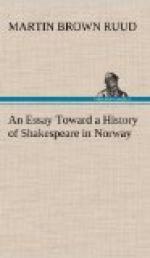Andre Heks: Moyrkjot av ein myr-orm kald so i gryta koke skal. Odle-augo, skinnveng-haar, hundetunge, froskelaar, sleve-brodd, firfisle-svord, ule-veng og lyngaal-spord til eit seid som sinn kann rengje hel-sodd-heitt seg saman mengje!
This is not only accurate; it is a decidedly successful imitation of the movement of the original. Madhus has done a first-rate piece of work. The language of witch-craft is as international as the language of science. But only a poet can turn it to poetic use.
Not quite so successful is Macbeth’s soliloquy when the death of Lady Macbeth is announced to him:
Det
skuld’ho drygt med.
Aat slikt eit ord var komi betre stund.—
“I morgo” og “i morgo”
og “i morgo,”
slik sig det smaatt fram etter, dag for
dag,
til siste ord i livsens sogubok;
og kvart “i gaar” hev daarer
vegen lyst
til dust og daude.
It is difficult to say just where the fault lies, but the thing seems uncouth, a trifle too colloquial and peasant-like. The fault may be the translator’s, but something must also be charged to his medium. The passage in Shakespeare is simple but it breathes distinction. The Landsmaal version is merely colloquial, even banal. One fine line there is:
“til siste ord i livsens sogubok.”
But the rest suggests too plainly the limitations of an uncultivated speech.
In 1905 came a translation of The Merchant of Venice by Madhus,[28] and, uniform with it, a little book—Soga um Kaupmannen i Venetia (The Story of The Merchant of Venice) in which the action of the play is told in simple prose. In the appendatory notes the translator acknowledges his obligation to Arne Garborg—“Arne Garborg hev gjort mig framifraa god hjelp, her som med Macbeth. Takk og aere hev han.”
[28. William Shakespeare—Kaupmannen
i Venetia. Paa Norsk ved
Olav Madhus. Oslo. 1905.]
What we have said of Macbeth applies with no less force here. The translation is more than merely creditable—it is distinctly good. And certainly it is no small feat to have translated Shakespeare in all his richness and fulness into what was only fifty years ago a rustic and untrained dialect. It is the best answer possible to the charge often made against Landsmaal that it is utterly unable to convey the subtle thought of high and cosmopolitan culture. This was the indictment of Bjornson,[29] of philologists like Torp,[30] and of a literary critic like Hjalmar Christensen.[31] The last named speaks repeatedly of the feebleness of Landsmaal when it swerves from its task of depicting peasant life. His criticism of the poetry of Ivar Mortensen is one long variation of this theme—the immaturity of Landsmaal. All of this is true. A finished literary language, even when its roots go deep into a spoken language, cannot be created in a day. It must be enriched and elaborated, and it must gain flexibility from constant and varied use. It is precisely this apprentice stage that Landsmaal is now in. The finished “Kultursprache” will come in good time. No one who has read Garborg will deny that it can convey the subtlest emotions; and Madhus’ translations of Shakespeare are further evidence of its possibilities.




